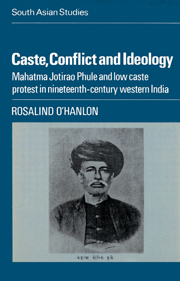 Caste, Conflict and Ideology
Caste, Conflict and Ideology Book contents
- Frontmatter
- Contents
- Acknowledgements
- Notes on translations and area under study, with map
- Part 1 Introduction
- Part 2 Religion and society under early British rule
- 2 From warrior traditions to nineteenth-century politics: structure, ideology, and identity in the Maratha-kunbi caste complex
- 3 The crisis of cultural legitimacy: missionaries, reformers, and Hindu society in the mid-nineteenth century
- 4 The growth of religious reform opinion in western India
- Part 3 Jotirao Phule and his circle: the emergence of a distinctive radical voice
- Part 4 The creation of a lower caste identity in history and popular culture, 1869–73
- Part 5 The lower caste community in contemporary society
- Part 6 Ideology and the non-Brahman movement in the 1880s
- Bibliographic note
- Bibliography
- Glossary
- Index
2 - From warrior traditions to nineteenth-century politics: structure, ideology, and identity in the Maratha-kunbi caste complex
from Part 2 - Religion and society under early British rule
Published online by Cambridge University Press: 14 October 2009
- Frontmatter
- Contents
- Acknowledgements
- Notes on translations and area under study, with map
- Part 1 Introduction
- Part 2 Religion and society under early British rule
- 2 From warrior traditions to nineteenth-century politics: structure, ideology, and identity in the Maratha-kunbi caste complex
- 3 The crisis of cultural legitimacy: missionaries, reformers, and Hindu society in the mid-nineteenth century
- 4 The growth of religious reform opinion in western India
- Part 3 Jotirao Phule and his circle: the emergence of a distinctive radical voice
- Part 4 The creation of a lower caste identity in history and popular culture, 1869–73
- Part 5 The lower caste community in contemporary society
- Part 6 Ideology and the non-Brahman movement in the 1880s
- Bibliographic note
- Bibliography
- Glossary
- Index
Summary
Introduction
In recent years, the perspectives provided by the history of specific castes or caste groupings have proved increasingly useful to historians looking at the broader changes taking place in South Asian society. This focus upon individual castes, and their changing fortunes under British rule, has acted as a healthy counter-balance to the study of political change in the larger societies of region and Presidency. Regional political studies, with their emphasis on British administrative and political institutions, have illustrated the complex interactions that lay behind the growth of some of the predominant styles of political organisation amongst Indians themselves. However, too great a preoccupation with the political responses of those who responded rapidly and directly to the extensions of British institutions leaves us in danger of undervaluing the very important role that older caste groupings, identities and ideologies played in the political mobilisation of many other areas of South Asian society.
There is a need to recognise that older groupings and identities formed the ideological background to the competing attempts of castes at all levels to adapt to the decay of some kinds of power and opportunity, and to their re-creation in new areas of society.
We may well be convinced, in principle, of the need for a wider definition of what constitutes ‘political’ activity in nineteenth-century South Asia. However, this shift of emphasis towards the investigation of older social structures and group identities, and their role in the nineteenth century, brings its own set of problems.
- Type
- Chapter
- Information
- Caste, Conflict and IdeologyMahatma Jotirao Phule and Low Caste Protest in Nineteenth-Century Western India, pp. 15 - 49Publisher: Cambridge University PressPrint publication year: 1985


